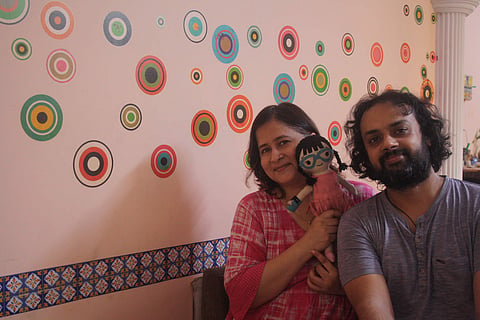

She is four and wears a pair of blue glasses and a little pink dress. She loves the rain and football. Children across genders love her and who knows, she may actually end up as their next superhero. Well, no one said that your superhero has to be a six-foot-tall muscular hunk who can do something supernatural. It can be a little doll who has nine fingers and a radial club hand with empathy as her superpower.
Ginny is the brainchild of a husband-wife duo, Dr Shweta Verma and Jamal Siddiqui, two social work professionals based out of Delhi. The couple, who sat down with us for a conversation, told us Ginny's story. "We had our son in 2016 and he was born with multiple conditions. As parents, this got us thinking of how the other kids will treat him. Who is going to teach children empathy, understanding of disability or diversity?” asks Shweta. There weren't a lot of books, shows or cartoons that were of help. So the couple thought of creating something on their own. And that is how Ginny's Planet was born. As part of this initiative, the duo conduct workshops on inclusivity and empathy for children. Two years later, they developed Ginny dolls for children to play with.
Having grown up around Punjabi households, Ginny was a fun Punjabi name that Shweta came up with. "It's a unisex name too," she says, adding that both boys and girls enjoy playing with her. "Like our son, Ginny too has nine fingers and a radial club hand (a hand that is bent like a golf club)," says Jamal. "We know our son's condition the best. So we thought of incorporating it in Ginny. Now, he doesn't think that it is unnatural for someone to have nine fingers," says Shweta, adding that Ginny is part of their family now and they even celebrate her birthday every year!
One of the things they're hoping to change is the perception of a disabled person, which stems from how a lot of people have told Shweta and Jamal that Ginny doesn't look 'disabled'. "People still think that disability is what is visible or profound. But that is not always the case," she explains. The duo adds that the workshops have been received quite well by children and adults.
Before COVID, they had partnered with schools and NGOs in Delhi to conduct a series of them. "Right now, we have a pan-India presence, since all our workshops and online," she says. Their youngest participant was six years old and she knows four-year-old boys who have bought Ginny dolls. The couple is now waiting for the pandemic to end and physical spaces to open, for them to conduct more workshops, mostly for people with no access to the internet and spread the message of empathy far and wide.
